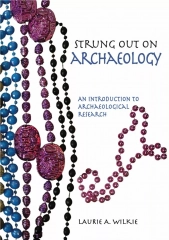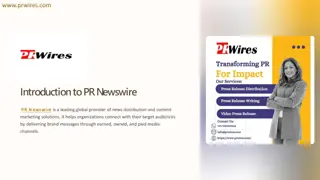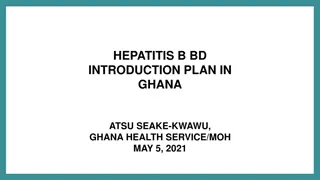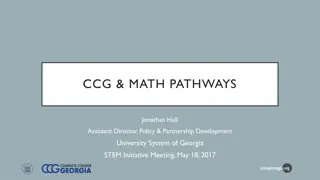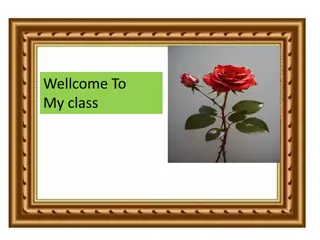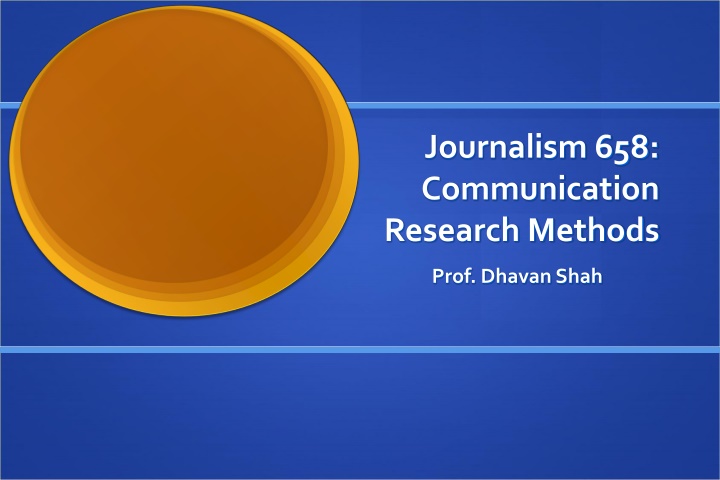
Advanced Communication Research Methods in Journalism and Strategic Communication
Dive into the world of communication research methods with Journalism 658. This course offers a foundational understanding of research methodology, critical skills development for undergrads and graduate students, hands-on research experiences, and group projects analyzing existing data. Explore topics such as evaluating research, readings in social research, exams structure, assignments, class research projects, project assignments, and group presentations.
Uploaded on | 0 Views
Download Presentation

Please find below an Image/Link to download the presentation.
The content on the website is provided AS IS for your information and personal use only. It may not be sold, licensed, or shared on other websites without obtaining consent from the author. If you encounter any issues during the download, it is possible that the publisher has removed the file from their server.
You are allowed to download the files provided on this website for personal or commercial use, subject to the condition that they are used lawfully. All files are the property of their respective owners.
The content on the website is provided AS IS for your information and personal use only. It may not be sold, licensed, or shared on other websites without obtaining consent from the author.
E N D
Presentation Transcript
Journalism 658: Communication Research Methods Prof. Dhavan Shah
Purpose 1. Basic grounding in research methodology for Undergrads: Journalism and Strategic Communication Investigative, analytic, and evaluative critical skills Graduate students: Foundation for thesis and dissertation research Introduction to range of research methods foundational skills 2. Evaluating and critiquing research 3. Hands-on research experience Group project - analysis of existing data
Readings Babbie, E. (2016). The Practice of Social Research. 14thed. Reserve Readings: online as PDFs @ class website Lecture slides available from class website All available from the class website https://dshah.journalism.wisc.edu/teaching/#j658
Exams 2 In-class exams: Midterm (40 points) Final (40 points) Take-home final Receive in class and due at final (20 points)
Assignments Ungraded assignments and workbook Brief assignments provided in class or available in workbook Will not be graded, but may help you internalize the material Definitions, scenarios, and discussion points
Class Research Project Existing survey data Three existing datasets I can share for testing 2016 Election National Rolling Cross Section 2018-2019 Election Swing State Panel Study 2020-2021 Election Wisconsin-Pennsylvania Panel Study Relationships between media use and relevant outcomes Linkage of message flows to attitudes and behaviors Sample of adults collected from across the nation or state Will collect interest today and assign you to teams Cluster you into teams of 3-4 based on common interests
Class Project Assignments Concepts and Questions Assignment 20 points, due week 6 Data and Methods Assignment 20 point, due week 11 Data Analysis Assignment 20 points, due week 13
Group Presentations 15-20 minute presentations: Framework and results of class project 40 points toward final grade Professor and students vote on best presentations Peer evaluation Each group members evaluates each other member Consider all aspects of project work 25 points toward final grade
Class Participation Small Class requires full participation 25 points -OR Ten percent of your overall grade Should be speaking up in class, engaging in small group activities, offering your perspective or opinion, asking questions Also means being a respectful listener to other Especially important to attend and participate in workshops Posting relevant materials to the class listserv also counts Good way for those who are shy about speaking out in class to engage
Academic Misconduct Harsh penalties (course failure referral to Dean of Students): Cheating Plagiarism Falsification of data
Grading 250 points Collective Grading (curve adjustments) Basic curve: 93-100% 88-92% 83-88% 78-83% 73-78% 68-73% below 68% A AB B BC C D F Additional Graduate Attribute for MA and PhD students
Why Research Methods? 1. Testing claims, observations, explanations, arguments, 2. Solving practical problems 3. Increasing knowledge and understanding 4. Honing precision of knowledge 5. Inherently interesting 6. Research ubiquity 7. Growing permeation in communication careers
Rigorous Investigation Basic steps in rigorous social scientific investigations: Specifying explanations (theories) Making observations Interpreting the results Refining explanations
Functions of Research 1. Exploration 2. Description 3. Explanation Most research involves all three Studies move toward exploration as knowledge accumulates
1. Exploration Learn about or familiarize Asking basic questions E.g.: How does the public feel about term limits? Do the people support the death penalty? Focus groups useful for exploration Purposes: 1. General understanding 2. Test feasibility of further research 3. Pretest methods of further research
2. Description Describing situations and events More deliberate than exploratory research Precise, measured description Idiographic orientation E.g.: U.S. Census Opinion polls How strong is public support for the war?
3. Explanation Getting at the question of why More than describing events Explain why they occur in a certain way Nomothetic orientation Laws that govern nature of relationships E.g., Going beyond opinion polls: Why are people voting for a certain candidate?
Workshop on Class Project 2016 Election National Rolling Cross Section 2018-2019 Election Swing State Panel Study 2020-2021 Election Wisconsin-Pennsylvania Panel Study All large sample size, national or multi-state, longitudinal surveys All contain detailed measures of news and social media use All contain measures of political attitudes toward leaders and candidates All contain measures of social and political trust All contain measures of civic and political behaviors All contain basic demographic information Download codebooks for all three projects from this link: https://dshah.journalism.wisc.edu/files/2016-2018-2020-Codebooks.zip
2016 Rolling Cross Sectional Study Collected from September 20 to November 7, 2016. The survey sample included about 100 respondents per day, using quota sampling from Qualtrics online panel to approximate U.S. Census data regarding age, race, education, and income. Each day consisted of a new sample, resulting in a final sample of 4,901 respondents over 49 days. Candidate feeling thermometer ratings Emotional reactions to candidates Candidate and political party characteristics Political knowledge (rolling current events) Attention to campaign News perceptions Political attitudes Vote certainty (before election) Vote choice and experience (after election) Liberal media Conservative media Social media use Popular stories on social media (rolling current events) Legacy news media Local news media Political conversation and social network Social media and news attitudes Political advertising exposure and reactions Confidence in election/belief in election fraud Partisanship, Ideology, and Issue Positions Demographics
2018-2019 Swing State Panel From October 26 to November 4, 2018, the first wave of a web-based, two-wave panel survey of registered voters in Wisconsin (N=2,058), Ohio (N=396), Michigan (N=391), North Carolina (N=369), and Pennsylvania (N=391), was collected. In wave two, launched in February of 2019, we were able to successfully recontact a subset of the same respondents in Wisconsin (N=1,058), Ohio (N=156), Michigan (N=121), North Carolina (N=133), and Pennsylvania (N=150). Respondents were recruited as part of an online panel by LHK Partners, a national survey research firm, using a nested quota sampling procedure stratified by age, gender, and race based on Census data from each state. Group closeness and social trust Institutional confidence Political participation Political talk and news networks Political conversation and online network Vote intention News perceptions Political attitudes Political efficacy Liberal media Conservative media New avoidance/fatigue Social media use Legacy news media Local news media News diet Media trust Candidate favorability and approval Religious traditionalism/modernism Racial resentment Campaign enthusiasm Partisanship, Ideology, and Issue Positions Demographics + Experiments!!!
2020-2021 Wisconsin-Pennsylvania Panel From October 21 to November 1, 2020, the first wave of a web-based, two-wave panel survey of registered voters in Wisconsin (N=3,076), Michigan (N=1,589), North Carolina (N=1,621), and Pennsylvania (N=1,751), was collected. In wave two, fielded from December 7, 2020 to December 15, 2020, we were able to successfully recontact a subset of the same respondents in Wisconsin and Pennsylvania (N= 1,849). Respondents were recruited as part of an online panel by LHK Partners, a national survey research firm, using a nested quota sampling procedure stratified by age, gender, and race based on Census data from each state. Group closeness and social trust Institutional confidence Political participation Political conversation and online network Vote intention News perceptions Political attitudes Liberal media Conservative media New avoidance/fatigue Social media use Legacy news media Local news media Media trust Candidate favorability and approval Health status, need for chaos, elitism Hostile sexism, materialism \/post-materialsim Racial resentment Campaign enthusiasm Partisanship, Ideology, and Issue Positions Cultural taste/religious traditionalism/modernism Occupation Demographics + Experiments!!!
Breakout groups! To spur conversation about these surveys and the questions you might choose to address, will break into groups for discussion. These are not the teams you will be assigned to next Tuesday when we meet in-person. Will assign based on your interests After class today, please send me an email (dshah@wisc.edu) with your preferred topic or topics. I will cluster people into teams. Will reconvene and discuss possible ideas for research projects.

